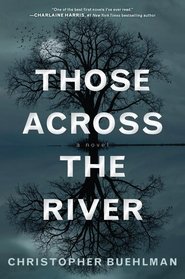Helpful Score: 4
Loups Garou by any other name...
Those Across the River is very, very good. It's the 1930's small town south of Harper Lee, has the creeping dread of Stephen King's Salem's Lot or Pet Cemetery and the brutality of Candyman. It's the picture of a small town during the Depression, with a festering wound dating to the Civil War; a rotting plantation, barbaric cruelty and payments made, for fear, for revenge or for vengeance.
The novel begins with Frank and Dora moving from Chicago to Whitbrow, Georgia in 1935. Frank, having cuckolded an influential university professor (and walked away with his wife,) was unable to find another teaching post, and was glad to inherit a house and his aunt's savings. They move to the town, intending that he will research the history of his family's life of his great-grandfather, a brutal plantation owner who had been killed during an uprising of his slaves, and that Dora will teach the older children at the school. Their move starts well enough, despite the moving van having hit a dog en route. There are no problems with the house, no animosity with the neighbours, but Frank is warned not to cross the river, especially after dark, and then there is the matter of the pigs...
Near perfect pacing, beginning with flickers of worry, building into dread, and erupting in horror and brutality. Laced with insightful thoughts/comments that make the characters very believable, and detailing that cements them into plausible rather than assaulting the reader with overly focused descriptions.
Caveat: for all its gentle beginnings, this is a horror novel. Violence, horror and festering evil are represented. There are no glittering vampires or kindly werewolves here.
The review copy was supplied to my through the publisher as part of LibraryThing's Early Reviewer program.
Those Across the River is very, very good. It's the 1930's small town south of Harper Lee, has the creeping dread of Stephen King's Salem's Lot or Pet Cemetery and the brutality of Candyman. It's the picture of a small town during the Depression, with a festering wound dating to the Civil War; a rotting plantation, barbaric cruelty and payments made, for fear, for revenge or for vengeance.
The novel begins with Frank and Dora moving from Chicago to Whitbrow, Georgia in 1935. Frank, having cuckolded an influential university professor (and walked away with his wife,) was unable to find another teaching post, and was glad to inherit a house and his aunt's savings. They move to the town, intending that he will research the history of his family's life of his great-grandfather, a brutal plantation owner who had been killed during an uprising of his slaves, and that Dora will teach the older children at the school. Their move starts well enough, despite the moving van having hit a dog en route. There are no problems with the house, no animosity with the neighbours, but Frank is warned not to cross the river, especially after dark, and then there is the matter of the pigs...
Near perfect pacing, beginning with flickers of worry, building into dread, and erupting in horror and brutality. Laced with insightful thoughts/comments that make the characters very believable, and detailing that cements them into plausible rather than assaulting the reader with overly focused descriptions.
Caveat: for all its gentle beginnings, this is a horror novel. Violence, horror and festering evil are represented. There are no glittering vampires or kindly werewolves here.
The review copy was supplied to my through the publisher as part of LibraryThing's Early Reviewer program.




